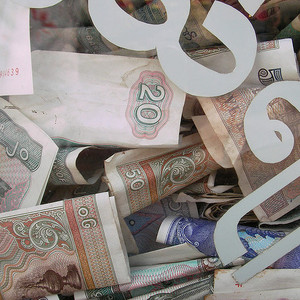In the developed world, a lot of money changes hands without anyone actually touching it. That’s because many people get paychecks, do their shopping, and pay their bills electronically. When you put your debit card into an ATM, you assume that the machine is connected to a trusted institution and knows how much is in your account and will, in fact, give you the amount of cash you asked for. In other words, you trust the process and the bank. But what if you couldn’t? Listen to find out how people in Myanmar are trying to adjust to banking electronically in a setting where it’s not always reliable.
Listen to the story
MELISSA BLOCK: Here in the U.S., we tend to take the ATM for granted. But in a developing country, it’s something of a miracle. The standard cash machine requires not only a lot of technology but also trust in the banking system.
Our Planet Money Team recently visited the country of Myanmar in Southeast Asia, also known as Burma. It’s been isolated from the West for decades but it now has ATMs. And NPR’s Robert Smith has the story of the first one to connect to the world.
ROBERT SMITH: A young woman dressed head to toe in bright yellow is about to do something she has only done a couple of times in her life.
NAN HTWE NYE: Yeah, I’m withdrawing my salary from the ATM machine.
SMITH: Now, you – electronically.
NYE: Yes.
SMITH: It’s deposited in your account, and then you pull the money out here.
NYE: Yeah.
SMITH: Nan Htwe Nye works at an elementary school. She started using the ATM in March, with limited success.
NYE: Some machine doesn’t work. But we hope it will be better in the future. Yeah.
(LAUGHTER)
SMITH: Nan has come to this ATM machine in downtown Yangon because it has a sort of magic reputation. It’s at the headquarters of CB Bank, the first cash machine in Myanmar to connect to banks all around the world.
(SOUNDBITE OF SIGNAL TONES)
SMITH: But getting this ATM up and running tells you a lot about the challenges that poor countries like Myanmar face. Inside the lobby of the CB Bank, you can see why they needed an ATM. The place is packed. People have brought in cash from their businesses in these giant rice bags.
One of the managers here, Zaw Myo Oo, says all they want to see the transaction on paper.
ZAW MYO OO: I don’t think they have internalized the process of virtual money yet. You know, like, you know, seeing your balance online not in actual black and white kind of paper in any kind of way.
SMITH: It looks like on this floor, anyway, about half your employees are just dealing with the sheer physical management of pieces of paper, yeah?
OO: Yes, they are.
SMITH: The next room is all money-counting machines. There is cash piled in the corners like old newspapers. Burly guys lift the bags onto their shoulders.
OO: You’ll see like, you know, some of them would stack really high and then throw it like this. Like, I’ve seen it in other banks, too, so…
(LAUGHTER)
SMITH: Literally throwing money around.
OO: Yeah.
SMITH: This all-cash economy is one of the things that’s holding back everything in Myanmar. New businesses, international partnerships, the world no longer operates on rice bags filled with paper money. And for years now, the managing director at CB Bank, Pe Myint, wanted to move this place into electronic banking. But there was a problem. Because of the military dictatorship, there were international sanctions on Myanmar. Pe would call up places like Visa and MasterCard and leave a phone message.
PE MYINT: But they do not reply any response from that day.
SMITH: They never called you back?
MYINT: No, no, no. They do not contact with us, because we are under the sanctions that indeed they are very scared about that, American government, that’s why they don’t contact with us.
SMITH: The sanctions started to be lifted last year, and MasterCard started to return those phone calls. But years of being off the grid had taken its toll on Myanmar. I called up the guy in charge of the country at MasterCard, Antonio Corro in Manila.
ANTONIO CORRO: Myanmar was, you know, was under isolation for more than four decades. So the infrastructure is, you know, is quite old.
SMITH: Corro says that normally when a bank has an international ATM, MasterCard brings in this giant box filled with servers and routers. It’s about the size of a small fridge. But Myanmar didn’t have the kind of phone lines, the communication lines that the box needed. They had to improvise. They hooked up the Myanmar ATM with a direct connection halfway around the world.
CORRO: To a centrally located processor in St. Louis…
SMITH: Wait. Wait. Wait, wait, wait. So instead of bringing the box to Myanmar, this special box is in St. Louis?
CORRO: Yeah. St. Louis is the global technology headquarters of MasterCard.
SMITH: So late last year, CB Bank hooked up a generator in the building for the daily power outages. They opened that direct line to St. Louis and, finally, fired up their international ATM. Over the next few months, they installed dozens more around the country. Other banks followed. But there was still one more problem to solve: Trust.
Banks have a terrible reputation in Myanmar. During the repressive era, there were runs on the banks, corruption. Numbers are hard to come by, but it’s estimated that less than 10 percent of the people here have bank accounts. Even middle-class families operate on a cash basis. Zeya Thu, a business columnist with the Voice newspaper, keeps his money at home.
ZEYA THU: Many of us, we don’t trust the banks, because, you know, the banks, they don’t work very well. If you want to withdraw the money from the bank, and then you face difficulties. Sometimes you have to bribe the staff at the counter to get your own money back.
SMITH: You have to bribe them.
THU: Yeah, yeah, yeah, to get your money back. So people don’t normally want to go to the, you know, bank and to put money in there. So they put their money under their mattresses.
SMITH: Back at CB Bank, they say that bad things may have happened in banks in the past. And, yes, they still have to build trust. And really, that’s one of the reasons why they went to all the trouble to install an ATM so prominently outside the bank.
UNIDENTIFIED WOMAN: (Foreign language spoken)
SMITH: They even put a video loop on the ATM. It shows rows of young women in uniform carrying large stacks of money around, as if to demonstrate that there is indeed something inside this machine.
But the real trust builder is seeing your friends and your neighbors successfully pull out cash. Nan Htwe Nye, the woman who was withdrawing her salary, seemed surprised when cash popped out.
NYE: Today it worked, so I’m lucky.
(LAUGHTER)
SMITH: Someday in Myanmar, getting cash out of a machine won’t be worth a mention. But not yet. Robert Smith, NPR News.
 © 2013 National Public Radio, Inc. Used with the permission of NPR. All rights reserved.
© 2013 National Public Radio, Inc. Used with the permission of NPR. All rights reserved. Vocabulary
- transaction – a business exchange or interaction
- international sanctions – actions taken by countries to force another country to change its conduct. International sanctions often involve restrictions on trade and the movement of money.
- fire up – to start, for example, by turning on an electric appliance
- bank run – a situation in which a large number of people withdraw their money from a bank because they don’t trust the bank to continue operating and fear they will lose their deposits
- corruption – dishonest behavior by people in power
Listening Comprehension Questions
- What is the experience of using an ATM like in Myanmar?
- Why do people at the bank want to see their balance printed out at the bank?
- What does it mean to say that Myanmar has an all-cash economy?
- Why has it taken Myanmar such a long time to begin electronic banking?
- What obstacles have made it difficult for electronic banking to catch on in Myanmar?
Discussion Themes
- Why do you think people in Myanmar carry their money in large bags rather than keep it in banks?
- What has happened in the past that has caused people in Myanmar not to trust banks? How would you feel about banks if you had had such experiences?
Teacher’s Guide
Activate student knowledge: Ask students if they know what happens when they use a debit card. Help them understand that when they use a debit card, money is transferred from their bank account to the business they are buying from. In other words, the payment is happening behind the scenes, with no cash money changing hands. Ask students: How do you know your debit-card transaction is happening accurately? Encourage them to think about the fact that they trust the bank to draw the right amount of money from the right account and transfer it to the right business. Ask: Why do you trust the bank? What might lead you not to trust the bank?
Introduce the story: In this audio story, you will hear about a country where most financial transactions are done with cash. Because of international sanctions imposed on Myanmar to express disapproval of its governing dictatorship, the country lags behind much of the world when it comes to developing a non-cash economy. Listen to find out what it looks like when people don’t trust banks and how difficult it is to introduce a post-cash economy in such a place.
Active listening supports: Choose one of the following listening organizers to support student understanding as they listen to the story.
- The Fact, Question, and Response worksheet will help inform students’ comprehension as they listen to the story.
- The Language Identification organizer allows students to follow along and track important phrases while listening to the story.
Reflect on the story: Take time for student reflection on the audio story and discussion questions to check for understanding. Ask students: How do you think people in Myanmar can become comfortable with a non-cash economy?
Paired Text: Pair this audio lesson with this article from the BBC about “Why Sweden is Close to Becoming a Cashless Economy,” which offers a counterpoint to Myanmar’s struggles to become less reliant on cash.


